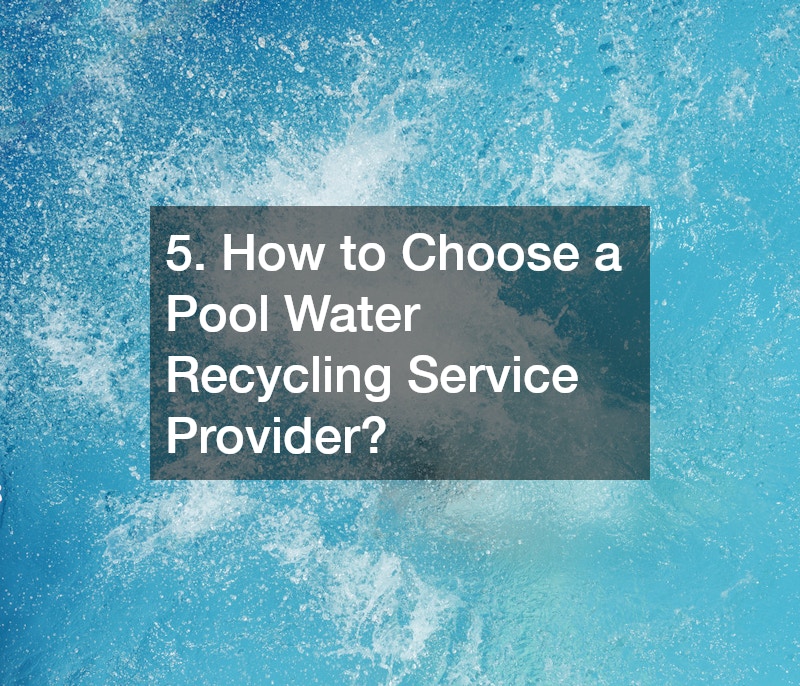Pool water recycling services play a crucial role in sustainable water management, offering both environmental and financial benefits. By recycling pool water, we can significantly reduce water waste and contribute to preserving essential resources.
1. What are Pool Water Recycling Services?
1.1 Definition and Purpose
Pool water recycling services involve processes that clean and reuse pool water, minimizing the need for fresh water replenishment. The primary goal is to promote water conservation while maintaining pool hygiene and safety standards.
These services are designed to address water scarcity issues by reducing overall water consumption in pool management. By decreasing the frequency of complete water replacement, pool water recycling also helps in lowering utility costs.
Moreover, this approach aligns with environmental stewardship initiatives, encouraging responsible resource use. Individuals and businesses can contribute positively to environmental conservation by opting for these services.
1.2 Types of Services Offered
Different pool water recycling methods help cater to varied pool sizes and needs. Services typically include filtration systems, reverse osmosis, and chemical treatments.
While filtration systems remove contaminants and debris, reverse osmosis offers a more comprehensive purification process. Chemical treatments further sanitize and maintain the water quality without necessitating drainage.
These techniques together ensure that the recycled water meets health standards. Choosing the appropriate service depending on the specific pool situation is crucial for optimal results.
2. How Do Pool Water Recycling Services Work?
2.1 Process Overview
The recycling process starts with an initial water quality assessment to determine the appropriate treatment method. The pool water is then pumped through high-efficiency filters to remove large debris and particles.
Advanced filtration and purification processes, such as granulated activated carbon filtering, are applied to eliminate impurities. Finally, the water is subjected to thorough chemical balancing to ensure it meets the required pH and sanitation levels.
This systematic process not only cleans the water but also helps in maintaining it for extended periods. The efficiency of each step ensures limited water waste and cost-efficiency.
2.2 Tools and Equipment Used
Various specialized tools and equipment are essential for effective pool water recycling. High-capacity pumps and portable filtration units form the backbone of these services.
Advanced systems like UV sterilizers and ozone generators further enhance water clarity and sanitation. These tools collectively ensure that recycled water is as clean and safe as fresh water.
Such technology makes pool water recycling a viable and sustainable option compared to traditional methods. It is this blend of technology and technique that makes the recycling process reliable and efficient.
3. What are the Benefits of Pool Water Recycling?
3.1 Environmental Impact
Pool water recycling significantly reduces environmental stresses by conserving water resources. This approach aligns perfectly with sustainability goals aimed at protecting aquatic ecosystems.
By decreasing the frequency of draining and refilling pools, less stress is placed on local water supplies. A frequently cited statistic is that recycling can save up to 70% of the water typically used in traditional pool maintenance.
As cities grow and water scarcity becomes more common, such conservation efforts are critical. By choosing pool water recycling, you contribute to a global initiative to protect this invaluable resource.
3.2 Cost Savings
Cost savings are a significant advantage of utilizing pool water recycling services. Regular recycling reduces the need for frequent water refills, which in turn lowers your utility bills.
Moreover, maintaining continuous adequate water quality decreases the necessity for expensive emergency treatments. Over time, the initial investment in recycling services becomes cost-effective.
For homeowners and establishments with large pools, these savings are particularly substantial. It’s a smart financial move that also promotes eco-friendliness.
4. Are There Any Alternatives to Pool Water Recycling?
4.1 Traditional Pool Draining
Traditional pool draining involves emptying the pool before refilling it with new water. Although straightforward, this method significantly increases water consumption.
In comparison, water recycling services curtail waste by reusing existing water. While traditional draining might seem effective in cleaning, it lacks the environmental and cost benefits of recycling.
The frequency of traditional pool draining also means higher maintenance costs over time, making it less feasible. In contrast, recycling offers a long-term, sustainable solution.
4.2 Pros and Cons of Alternatives
While traditional draining might guarantee immediate clarity, it comes with environmental drawbacks. High water waste and increased chemical usage are significant concerns with traditional draining.
In contrast, pool water recycling effectively uses and cleans the same water multiple times. However, the initial setup cost for recycling can be higher, though it offers better long-term gains.
This duality means pool owners need to weigh immediate costs against long-term benefits carefully. For many, the enduring benefits of recycling make it a more appealing choice.
5. How to Choose a Pool Water Recycling Service Provider?
5.1 Key Considerations
Choosing the right service provider involves assessing several important factors. Reputation, expertise, and technology are paramount when selecting a pool water recycling company.
Additionally, checking customer reviews and ratings can provide insight into a provider’s reliability. Quality assurance and the range of services offered should align with your specific pool needs.
Ensuring that the provider follows best practices in water conservation further enhances your choice. These considerations help in selecting a provider committed to delivering quality and efficiency.
5.2 Questions to Ask Potential Providers
Before hiring, pose critical questions to potential pool water recycling providers. Inquire about their methods, tools, and experience in the field.
Ask about any warranties or guarantees for the services offered. Their response can reveal much about the quality and reliability of their operation.
By asking these pertinent questions, you ensure that the service aligns with your expectations. Trusting your service provider means you can confidently enjoy the benefits of recycling.



